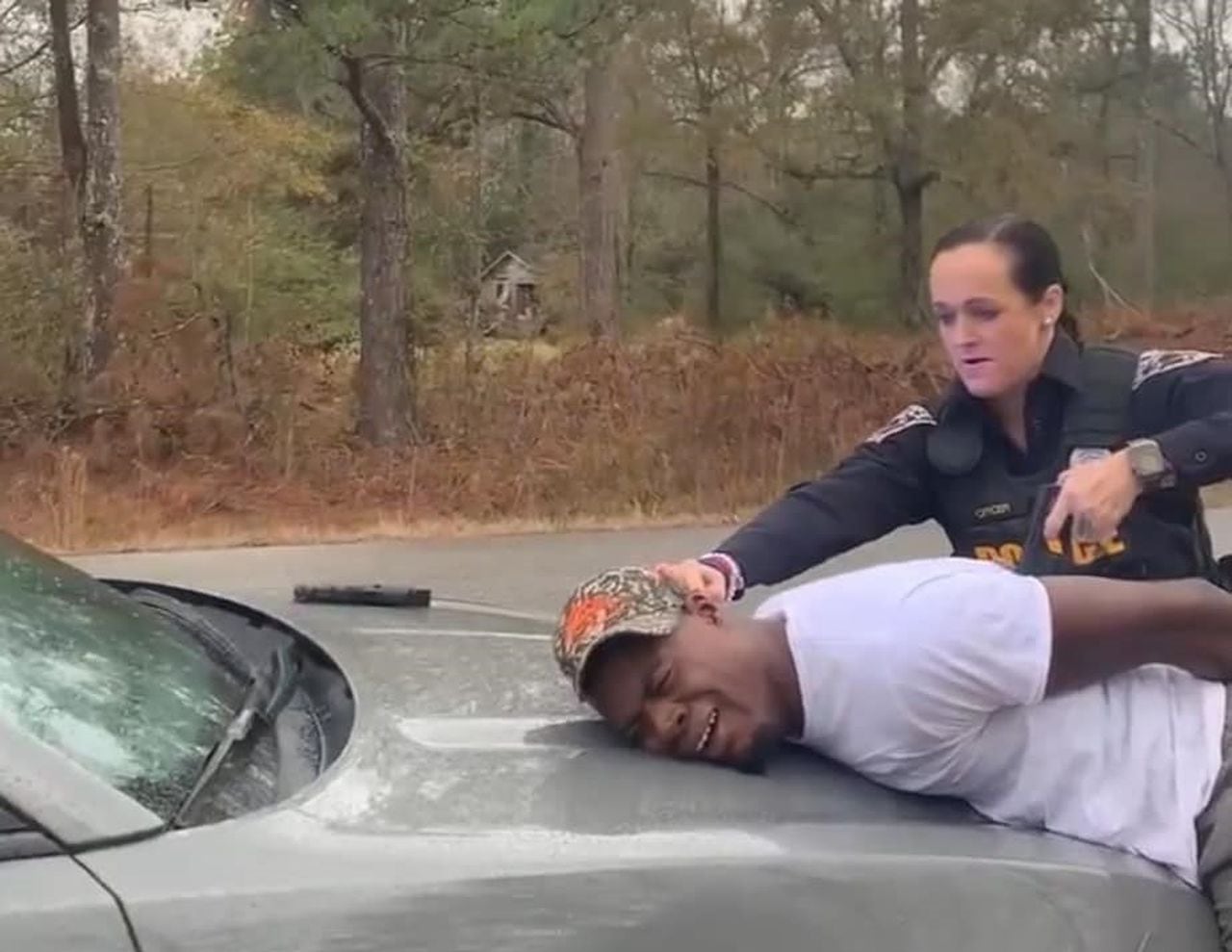Roy S. Johnson: As he cried, screamed, âOh, no,â we heard George Floyd
This is an opinion column.
He was George Floyd. The way he lay prone, face pressed against the hood, hands bound, he was George Floyd.
With Police Officer Dana Elmore’s stun gun aimed at the square of his back, he was George Floyd.
Through tears, through fear, through his cries, “Oh, no! Oh, no! Oh, no!” he was George Floyd.
She was Derek Chauvin.
Shut the f—k up.
Do you want it again?
Shut your bitch ass up.
She was…evil
It was a quiet road in Pickens County. Not the intersection of 38th & Chicago in Minneapolis.
Though it might as well have been.
It was last Saturday, December 2. Not May 25, more than three years ago.
Though it might as well have been.
The man was not George Floyd, thank God. Though I felt as if a knee was on my neck.
Micah Washington is the 24-year-old Black man who ended up face-down on the hood of a vehicle and at the wrong end of a stun gun wielded by a white female police officer from Reform, Alabama.
Ended up there after being approached by Elmore while he changed a tire not far from his aunt’s house, as Washington’s attorney, LeRoy Maxwell, Jr. shared with my colleague Carol Robinson. She asked for I.D., the lawyer added. Washington said he didn’t have to show I.D. for changing a tire.
Changing a Tire While Black is not a thing. At least not yet.
Washington reached for his cell phone to begin taping the encounter. That’s when Elmore tased him, Maxwell later told me. He fell to the ground.
This is where we began on the video (shot by Washinton’s brother), with Washington, head on the hood of a car, handcuffed, and confused. Where we began to see George Floyd. Where we began to cringe, hurt, and filled with anger—just as we did as Floyd called for his dead mother and died beneath Chauvin’s knee.
We hear Washington cry and scream, “Oh, my God” time and time again—and we hear George Floyd.
Founded more than two centuries ago, Pickens is named for Andrew Pickens, a militia leader who fought for the rebels in the Revolutionary War and later represented South Carolina, his home state, in Congress. He was also a slave owner.
The county, not surprisingly, contained numerous plantations and farms, and has long been home to many Native Americans; notably the Muscogee people before most were forcibly driven to then Indian Territory (now Oklahoma, my home state).
Starting in the mid-20th century, many African Americans fled Pickens to escape racial terrorism. According to the Equal Justice Initiative, there were 15 “known” victims of hate violence in Pickens County between 1883 and 1917. Five were Paul and Will Archer, Emma Fair, Ed Guyton, and Paul Hill, all shot to death in Carrollton under false accusations.
More recently, Pickens crossed my radar. In 2016, Sean Worsley, a disabled Iraqi War vet, and his wife stopped for gas in Gordo, once an infamous “sun-down town.” An officer rolled by, told Worsley to lower the music in his car, then arrested him for possession of medical marijuana (which, thankfully, is no longer illegal in the state) that was legally prescribed in his home state of Arizona.
Fast forward: Worsley, who suffers from PTSD, was convicted and sentenced to five years in prison. He served eight months before being granted parole and freed in November 2020.
Two years ago this week, Glenn Foster, Jr., a former New Orleans Saints defensive lineman, was pulled over for speeding in Pickens and held by police. Two days later he was dead. Foster was Black.
The family recently filed a wrongful death lawsuit in federal court, alleging county sheriff’s deputies and jail staff “excessively assaulted, battered, strangled, and ultimately killed Foster, while denying him access to medical treatment.” (Authorities say Foster died after allegedly leading police on a high-speed chase that resulted in a crash, reports AL.com colleague Carol Robinson. His family acknowledges Foster had “mental health challenges” and insists he suffered a manic episode before and during the arrest.)
Last Saturday, as Washington lay on that hood, he told Elmore he had a gun, which she retrieved–laughing while doing so and saying, “Oh, yeah.”
Washington was jailed but is a free man now. Freed on Tuesday after an initial charge of trafficking fentanyl was dropped at the request of 24th Judicial Circuit District Attorney Andy Hamlin and granted by District Judge Lance Bailey.
Washington was initially also charged with obstructing government operations, resisting arrest, and first-degree possession of marijuana. The judge’s order also dropped the bond from $500,000 to $5,000.
That’s right. Five thousand.
Maxwell says he plans to file a $20 million lawsuit on behalf of his client.
Elmore is on admin leave while the department investigates what Reform’s police chief earlier termed “a citizen’s arrest.”
A citizen, just like George Floyd.
I’m a Pulitzer Prize finalist for commentary and a member of the National Association of Black Journalists Hall of Fame. My column appears on AL.com, as well as the Lede. Check out my podcast series “Panther: Blueprint for Black Power,” which I co-host with Eunice Elliott. Subscribe to my free weekly newsletter, The Barbershop, here. Reach me at [email protected], follow me at twitter.com/roysj, or on Instagram @roysj
